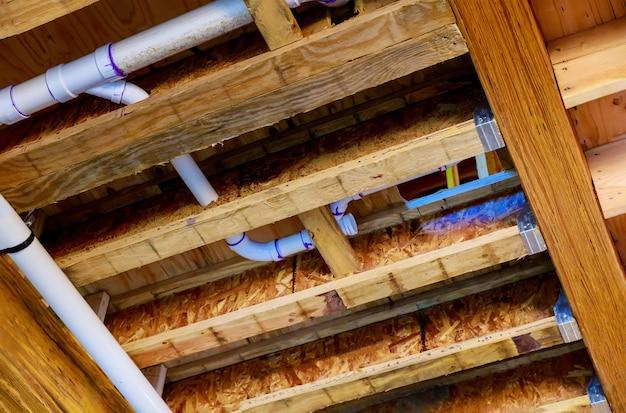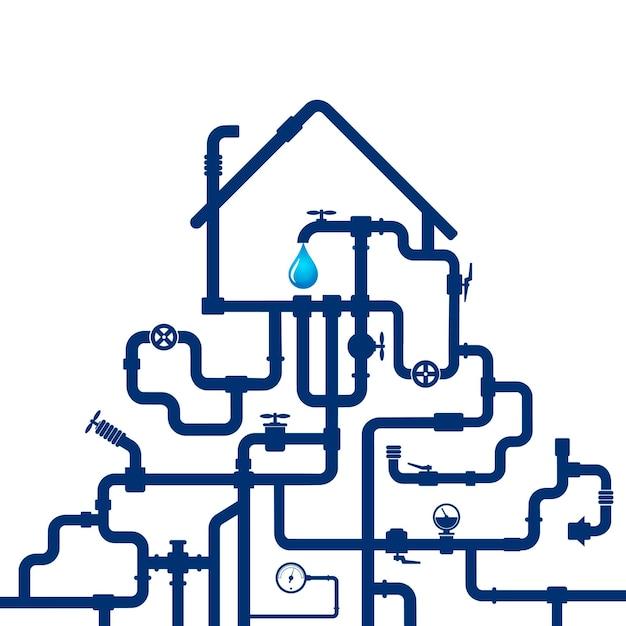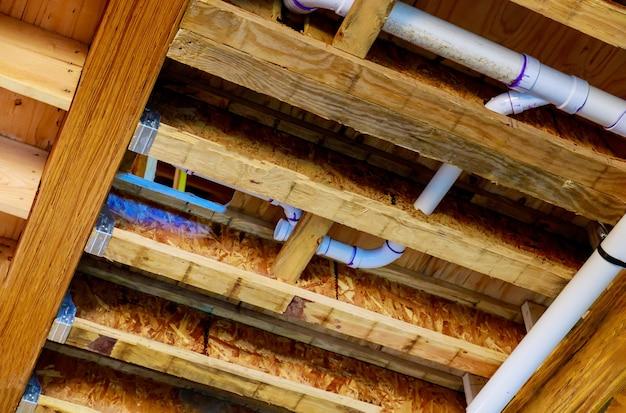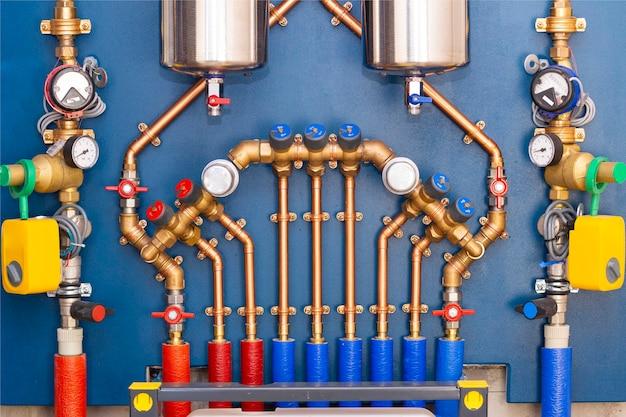Is your house plagued with leaky faucets, low water pressure, or rusty pipes? If your home is over 50 years old, it could be time to consider repiping. Repiping a house involves replacing outdated plumbing systems with new ones that conform to current industry standards. But before you start, it’s important to understand the process, costs, and benefits of repiping.
Repiping a house on a slab is different from repiping one on a raised foundation. Using PEX pipes instead of copper or galvanized steel pipes can also affect the cost. But, will repiping add value to your home, and is it worth it?
In this blog post, we’ll answer all your questions about repiping a house, including when to repipe, the cost implications, and the timeline. We’ll also examine whether repiping adds value to your property or not.
If you’re considering repiping your house or need to know when to consider it, then this blog post is for you. Keep reading to find out more!
Replumbing a House: What You Need to Know
Are you planning to replumb your house? Congratulations! This is a significant home improvement project that will have a major impact on your daily life. However, before you get started, there are a few things you need to know.
Understanding the Scope of the Project
Replumbing a house is a big job. It involves replacing all of the existing plumbing in the house, which means tearing down walls, removing old pipes, and installing new ones. This is not a project for the faint of heart, and it can take several weeks to complete.
Hiring a Professional Plumber
While it can be tempting to try to tackle a replumbing project on your own, it’s not recommended. This is a complex job, and it requires the expertise of a professional plumber. Make sure to hire a licensed and insured plumber who has experience with replumbing projects.
Choosing the Right Pipes
When it comes to replumbing your house, you have several options when it comes to piping materials. Copper, PEX, and PVC are all popular choices, and each has its pros and cons. Your plumber can help you choose the right pipes for your specific needs.
Updating Fixtures
While you’re replumbing your house, it’s a great time to update your fixtures as well. Consider replacing your old faucets, showerheads, and toilets with newer, more efficient models. This will not only improve the overall appearance of your home but can also save you money on your water bill.
Dealing with the Mess
Replumbing a house is messy work. There will be dust, debris, and noise throughout the entire project. Make sure to plan accordingly and prepare your home for the mess. Cover furniture and floors with tarps, and communicate with your plumber about how to minimize dust and debris.
Replumbing a house is a significant undertaking, but it can improve the overall safety and comfort of your home. By hiring a professional plumber, choosing the right pipes, updating your fixtures, and planning for the mess, you’ll be well-prepared for a successful replumbing project.
Repiping a House on a Slab
If you have a house built on a concrete slab foundation, repiping can be a bit more challenging. Unlike houses built on crawl spaces or with basements, you don’t have easy access to the plumbing pipes underneath the house. So what are your options for repiping a house on a slab?
Identify the Pipes that Need Replacing
The first step is to identify the pipes that need to be replaced. You can do this by checking your water bill for any sudden spikes in usage, looking out for discolored water or low water pressure, or noticing any wet spots on your floors or walls. Once you’ve identified the problem, it’s time to find the pipes.
Options for Accessing Pipes
One way is to dig through the concrete slab to reach the pipes. This is an invasive method that involves cutting the concrete floor, which can be time-consuming, messy, and expensive. Another way is to use an in-pipe video camera to see inside the pipes and locate any leaks or clogs. An experienced plumber can then use specialized tools to make repairs from inside the pipe without damaging your floors.
Consider Re-routing Pipes
If your pipes are corroded or damaged beyond repair, you may need to consider re-routing your plumbing system. This involves running new pipes through your walls and ceilings, which can be expensive but eliminates the need for any excavation work. This option also gives you the opportunity to upgrade your plumbing system and install modern fixtures and appliances.
Hire a Professional Plumber
Repiping your house on a slab is a complex job that requires specialized tools and expertise. It’s best to hire a professional plumber who has experience in dealing with slab plumbing issues. Look for a licensed and insured plumber who can provide references and offers warranties on their work.
In conclusion, repiping a house on a slab can be a daunting task, but it’s not impossible. With the right tools, knowledge, and expertise, a professional plumber can help you restore your plumbing system and ensure that you have clean and safe water flowing through your home.
Does Repiping a House Add Value
If you are a homeowner, you may be wondering whether repiping your house adds any significant value to your property. Repiping is a significant investment, and it’s only natural to want to know whether it is worth the cost. Let’s take a look at some of the factors that can influence the value of a repiped home and see whether repiping your house can add value to your home.
The Amount of Damage the Current Piping Has
The first factor to consider is the level of damage your current piping system has. If you have old, damaged pipes, replacing them will help improve your home’s value. Old pipes can decrease the functionality of your plumbing system, which can negatively impact your home’s value.
The Cost of Repiping
Repiping can be costly, but it’s a long-term investment that will add value to your home. However, it’s important to ensure that the cost of repiping your home doesn’t exceed the market value of your home. It’s essential to get a quote from a professional and compare it with the value of your home to see whether it’s worth your investment.
The Age of Your Home
The age of your home is another critical factor to consider. If you have an older home, repiping can significantly add value to it. Older homes are more likely to have outdated piping systems, which can reduce their value. Repiping ensures that your plumbing system is functioning correctly, making it more attractive to potential buyers.
Energy Efficiency
Repiping your home can also improve energy efficiency. It’s estimated that up to 30% of a home’s energy costs are related to heating water. Repiping can help reduce energy costs by improving the efficiency of your plumbing system. This will be an attractive feature to potential buyers, which can add value to your property.
Repiping a house can be a significant investment, but it can add value to your property. The amount of value added will depend on several factors, including the level of damage your current piping has, the cost of repiping, the age of your home, and energy efficiency. It’s essential to consult with a professional plumber to determine whether repiping your home is worth your investment.
Is it worth it to repipe a house
If you’re experiencing low water pressure, rusty water, or frequent leaks in your plumbing system, you might be wondering whether it’s worth it to repipe your house. The answer is not straightforward, and it depends on several factors that you need to consider before making a decision.
Age of your plumbing system
One of the critical factors that determine whether you should repipe your house is the age of your plumbing system. If your pipes are more than 50 years old, it’s likely that they have started to deteriorate and lose their effectiveness. In this case, repiping your house will be a wise decision because it will save you from the constant repairs and maintenance that old pipes require.
Severity of the problem
Another factor to consider before deciding whether to repipe your house is the severity of the problem. If you’re experiencing minor leaks or low water pressure, a simple repair might solve the issue. However, if you’re facing severe leaks, pipe bursts, or other significant plumbing problems, repiping your house might be the best course of action.
Cost of repiping
Repiping your house is a significant investment that can cost you several thousand dollars. However, the cost of repiping depends on several factors, such as the size of your house, the type of pipes you choose, and the extent of the work required. You’ll need to get quotes from different plumbing contractors and compare their prices before making a decision.
Benefits of repiping
Although repiping your house can be an expensive and time-consuming process, it comes with several benefits that make it worth it. Repiping your house with new, high-quality pipes will improve the water pressure, reduce the risk of leaks and pipe bursts, and eliminate rust and other contaminants from your water supply. Moreover, modern pipes are more energy-efficient than old pipes, which can help you save on your water bills over time.
In conclusion, whether it’s worth it to repipe your house depends on several factors that you need to assess carefully. If your plumbing system is old, and you’re experiencing severe plumbing problems, repiping your house will be a wise investment that will save you from the constant repairs and maintenance. However, you need to consider the cost of repiping, get quotes from different contractors, and weigh the benefits of repiping against the cost.
When Should a House Be Replumbed
If you’re considering a plumbing project, have an older house, or are having persistent plumbing problems, you may be wondering if it’s time to repipe or replumb your home. Here’s a guide to help you determine if and when it’s time to replumb your house.
Age of pipes
The age of pipes is a crucial factor in determining whether a house needs to be replumbed or not. Most professionals recommend that houses with plumbing more than 50 years should be considered for repiping. Over time, pipes inevitably corrode, rust, and degrade, leading to leaks, reduced water pressure, and other problems.
Signs of plumbing problems
If you’re experiencing common plumbing issues like clogged drains, low water pressure, or slow draining pipes, it could be a sign that your plumbing system needs attention. Also, if you’re having frequent leaks in your home’s pipes or evidence of water damage, it’s crucial to have a professional plumber inspect your pipes and offer solutions.
Poor water quality
If you notice that the water coming from your faucets is cloudy, smells bad, or tastes off, it may be due to a plumbing issue. Old pipes can introduce unwanted debris, sediment, and rust into your water supply, resulting in poor water quality.
Outdated materials
If your home was built with galvanized steel, cast iron, or other outdated materials, it may be time to consider a repipe. These materials are known to degrade over time and can lead to a host of plumbing issues.
Bottom line
Deciding when to repipe or replumb your house is a significant decision that requires careful consideration. If you’re concerned about your home’s plumbing system, it’s best to consult with a qualified plumbing professional who can assess your situation and provide solutions that meet your needs and budget.
Remember, when in doubt, don’t hesitate to call in a plumbing professional. It’s better to have an expert assess the situation and offer solutions than to delay, leading to potentially costly plumbing problems down the line.
Cost to Replumb a 1,500 Sq Ft House
Replumbing an entire house can feel daunting, especially when considering the cost. The cost to replumb a 1,500 sq ft house can vary depending on several factors such as the complexity of the job and the materials used.
Factors that Affect the Cost
Size of the House
The cost of replumbing a 1,500 sq ft house will differ from that of a 2,500 sq ft house. Larger homes require more piping, more fixtures, and more time to complete the job.
Complexity of the Job
The more complex the job, the more it will cost. For example, if the plumbing system needs to be rerouted, it will cost more than simply replacing old pipes with new ones.
Materials Used
The cost of materials can vary significantly depending on the type of pipes used. Copper pipes are more expensive than PVC or PEX pipes. However, copper pipes have a much longer lifespan of up to 50 years, compared to PVC or PEX pipes which have a lifespan of 20-25 years.
Average Cost
On average, the cost to replumb a 1,500 sq ft house is between $4,000-$10,000. However, the cost can be higher or lower depending on the factors mentioned above.
Cost-saving Tips
Compare Quotes
Always compare quotes from multiple contractors to find the best deal. Don’t just settle for the first contractor you find.
DIY
Consider doing some of the work yourself to save money. However, be sure you have the knowledge and expertise to do the job properly.
Plan Ahead
Don’t wait until your plumbing system fails before considering a replumb. Plan ahead and budget for it over time to make it more affordable.
Replumbing a house can be a large investment, but it’s important to ensure your plumbing system is in good condition to avoid costly repairs and damage in the future. By keeping these factors and cost-saving tips in mind, you can get a better idea of the cost to replumb a 1,500 sq ft house and make a more informed decision.
How Much it Costs to Repipe a House in California
Repiping a house can be costly, and the total cost varies depending on various factors. In California, the cost of repiping a house ranges from $4,000 to $10,000. This amount can be higher or lower, depending on the size of the house and the materials used.
Factors that Can Affect the Cost of Repiping a House
Several factors can affect the cost of repiping a house. Here are some of the critical factors that can determine the total cost.
Size of the House
The size of the house is one of the primary factors that can affect the cost of repiping a house in California. Generally, the bigger the house, the more expensive it will be to repipe.
Type of Pipes and Materials
The type of pipes and materials used for repiping can also affect the overall cost. PEX pipes are generally cheaper than copper pipes, but they may not be as durable.
Accessibility
The accessibility of the plumbing system in the house can also impact the cost of repiping. If the pipes are easily accessible, the cost may be lower. However, if the pipes are in hard-to-reach areas, the cost may be higher.
Experience of the Plumber
The experience and expertise of the plumber can also affect the total cost of repiping a house. A highly experienced plumber may charge more for their services, but they are more likely to do an excellent job.
Repiping a house can be a costly but necessary process. In California, the cost of repiping a house can range from $4,000 to $10,000, depending on various factors. However, it’s essential to remember that the cost of repiping is an investment that pays off in the long run by preventing costly water damage and increasing the value of your home.
How Long Does it Take to Repipe a House with PEX
If you’re planning on repiping your house with PEX pipes, you’re probably wondering how long the process will take. The answer depends on a few factors, such as the size of your home and the complexity of the job. Here’s what you need to know.
Factors That Affect the Time it Takes to Repipe a House
Size of Your House
The bigger your house, the longer it will take to repipe it. A small house with just one bathroom might take a day or two, but a large house with multiple bathrooms and more complex plumbing systems can take several days or even a week.
Complexity of the Job
If your plumbing system is old and needs a lot of repairs, it will take longer to replace all the pipes than if you’re just doing a simple upgrade. In some cases, the plumbers may need to remove drywall or other materials to access the pipes, which can add extra time to the project.
Accessibility
The location of your pipes can also impact how long it takes to repipe your house. If the pipes are located in tight spaces or hard-to-reach areas, this can slow down the process.
How Long Does It Take on Average
On average, it takes about three to five days to repipe a house with PEX pipes. However, as mentioned earlier, this can vary depending on the factors mentioned above.
If you’re only replacing a single section of your plumbing system, such as the hot water pipes, it could take as little as a day. But for a full repipe project, you should budget at least a few days.
Repiping your house with PEX pipes can be a significant project, but it’s worth it in the long run. The time it takes to complete the project depends on various factors, but on average, it takes about three to five days. Be sure to work with a reputable plumber who can help you estimate the timeline for your specific project.
How Much Does It Cost to Replumb a 2000 Square Foot House
If you’re considering replumbing a 2000 square foot house, one of the first questions that comes to mind is the cost. Several factors can affect the cost of replumbing a house, including the size of the house, the complexity of the job, and the type of pipes and fixtures you choose.
Factors That Affect the Cost of Replumbing a 2000 Square Foot House
The cost to replumb a 2000 square foot house varies widely, but you can expect to pay between $3,500 and $7,500 on average. However, several factors can affect the final cost.
The Size of the House
The larger the house, the more pipes and fixtures you will need, which can increase the cost of the job. Additionally, if your house has multiple stories or complex plumbing needs, the cost can be higher.
The Type of Pipes and Fixtures
There are many types of pipes and fixtures available, each with its own cost. For example, copper pipes are generally more expensive than PVC pipes, and high-end fixtures can cost significantly more than standard fixtures.
The Complexity of the Job
If your house has existing plumbing issues or requires extensive remodeling, the cost can be higher. Additionally, if you live in an area with strict building codes, you may need to pay more to comply with these regulations.
How to Save Money When Replumbing a 2000 Square Foot House
Fortunately, there are several ways to save money when replumbing a house.
Do Your Research
Before you start the job, research different plumbers, types of pipes and fixtures, and the expected cost of the job. This will help you make informed decisions and avoid unexpected expenses.
Choose Affordable Options
While high-end fixtures might look impressive, they can significantly increase the cost of the job. Opting for more affordable options can save you money without sacrificing quality.
Be Prepared
Be prepared for the replumbing job by clearing out the area around the pipes, marking where existing pipes are located, and ensuring that the plumbing contractor has easy access to the job site. By doing this, you can help the job go more smoothly, which can save you money in the long run.
Replumbing a 2000 square foot house can be an expensive undertaking, but by understanding the factors that affect the price and taking steps to save money, you can decrease the cost of the job without sacrificing quality.



